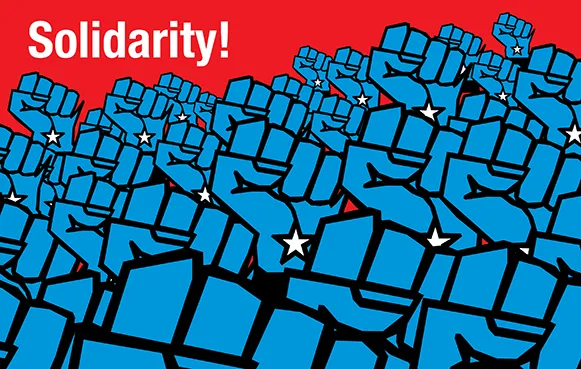'We're still standing'

By BERRY CRAIG
AFT Local 1360
Like a lot of Kentuckians who pack a union card, I'm on Cloud 10--the one above Nine--over the election of Joe Biden and Kamala Harris.
At the same time, our soul-trying times continue from Jordan to Jenkins. Mitch McConnell (and Donald Trump) won the state in blowouts again. By wide margins, voters sent all five Bluegrass State Republican congressmen back to Washington. (There was one bright spot in the U.S. House vote: Rep. John Yarmuth, D-Louisville, organized labor's only Kentucky friend on Capitol Hill, clobbered another Republican.)
'Meanwhile, the GOP union-busters enhanced their state Senate and House super-majorities.
Doubtless, the labor haters' agenda for the January General Assembly session includes renewing their holy war against unions. (The Democrats will try to stop the GOP juggernaut, but it will be well-nigh mission impossible.)
Maybe it'll be cold comfort for us when lawmakers go at us again in Frankfort, but history teaches that organized labor has been down--way down--before in Kentucky and nationwide.
When the 20th century turned, organized labor had few friends in local, state or national government. Unions were under almost constant attack from millionaires in business, industry and finance.
The old Robber Barons bankrolled right-wing legislators in Washington and in statehouses to do their bidding. They lavished tons of money on anti-union propaganda groups like the National Association of Manufacturers, which demonized unions and hyped the "open shop," a forerunner of “right to work.”
Similarly, Citizens Alliances scorned unions as “evil and un-American" and they condemned the labor movement as “the heaviest oppressor of the workingman.”
Too, almost all of the mainstream media was fiercely anti-union. The country’s tiny labor press battled back as best it could.
“Again, let the unions understand that they may expect nothing of value from their natural enemies—and in the final analysis the question is sifted down to and rests upon and is controlled by the economic interests of the employing class as opposed to those interests of the working class,” the feisty Louisville-based Ohio Valley Worker warned in 1904.
The paper called for a stronger labor media. “The workers must awaken to a proper defense of their interests, and this can be done only by and through the press which they own and control, and not through the press that gives Labor the hot end of it in every great issue and on every great question.”
The Republicans were sure organized labor was a goner in the 1920s. Union organizers were jailed. Strikebreaking was widespread; cops and sheriff's deputies escorted scabs through picket lines and beat up and jailed strikers. Workers who supported unions were fired and blacklisted.
In 1929, years of union-busting, driving down wages and Republican trickle-down—“trickle on” is more like it--economics helped bring on the Great Depression.
In the 30s, FDR and a New Deal Democratic Congress helped put the country back to work and guaranteed workers the right to organize and bargain collectively. An unprecedented surge in union membership followed.
Anyway, "We're still standing" was the theme of the 2017 Paducah Labor Day parade. Kentucky unions still stand, "bloodied, but unbowed."
Those words come from Invictus, a poem written by William Ernest Henley, a Scot, in 1875. Invictus was the favorite poem of Eugene V. Debs, the famous labor leader and five time Socialist candidate for president.
Shortly before he died, "he asked his wife for paper and pencil, so he could leave her with a few lines" from the poem, according to The Chicago Tribune's Ron Grossman. "In a wavering hand, he wrote:
It matters not how strait the gate,
How charged with punishments the scroll,
I am the master of my fate,
I am the captain of my soul.
The poem inspired many civil rights champions worldwide from Nelson Mandela to Dr. Martin Luther King Jr. (Mandela and King also championed free trade unions.)
Here's Invictus in its entirety:
Out of the night that covers me,
Black as the Pit from pole to pole,
I thank whatever gods may be
For my unconquerable soul.
In the fell clutch of circumstance
I have not winced nor cried aloud.
Under the bludgeonings of chance
My head is bloody, but unbowed.
Beyond this place of wrath and tears
Looms but the Horror of the shade,
And yet the menace of the years
Finds, and shall find, me unafraid.
It matters not how strait the gate,
How charged with punishments the scroll,
I am the master of my fate:
I am the captain of my soul.